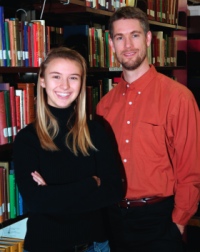Next: From Russia with love
Posted Jan. 12/08

Elly Adeland is one of the students engaged in community-based research under the guidance of assistant professor Peter Andree. (Photo: Chris Strangemore)
Students in the Faculty of Public Affairs are often drawn to their areas of study by a desire to make a difference in the world. For eight students taking an environmental politics course, a new approach to their studies is allowing them to have an immediate effect in the community. By working with Just Food Ottawa, a non-profit group dedicated to a just and sustainable food system in Ottawa, the students earn academic credit while performing community-based research.
“Community service learning gives students learning opportunities they couldn’t get in class,” says assistant professor Peter Andree, who developed a course on the Canadian food system with a community development approach at Trent University, in which his students became involved with local organizations active on food issues. He brought the approach with him to Carleton, and offered community service learning to his third-year class.
Community service learning, an educational approach that gives students the opportunity to learn from and contribute to community organizations, differs from field placements and cooperative education in its focus on civic and social responsibility. In helping community organizations to build capacity and research expertise, students reflect on community service as part of their studies and contribute to community development goals.
To assist Just Food Ottawa, two mass communications students undertook content analysis of news clippings on food issues and six students worked on designing web resources for the organization. With access to academic resources not available to Just Food Ottawa, the students wrote discussion papers touching on the environment, agriculture, health and food policy, complete with annotated bibliographies and links to current reports.
“I think it is vital for university students to participate in the community as much as possible,” says Elly Adeland, one of the students who swapped a major assignment for a chance to do community-based research. “It makes me happy to know that the work I am putting into this project will be able to assist an organization in Ottawa, instead of being just another paper I am required to write.”
“Doing a service-based learning assignment benefits the student and the organization. I didn’t know a lot about food safety issues when I took on this assignment, but the research I have done for Just Food has proven to be very applicable information for my class,” she says. “I felt like I had a purpose when writing my papers.”
———————–
Fast fact…
Community-based research projects and experiential learning are happening across campus. A new committee is now collecting and tracking the projects university-wide that engage the community and contribute to the livability, sustainability and fairness of the community. The Initiative for Community-University Engagement will help to coordinate and support teaching, research and fundraising activities, and nurture and promote this important relationship between Carleton and the community.